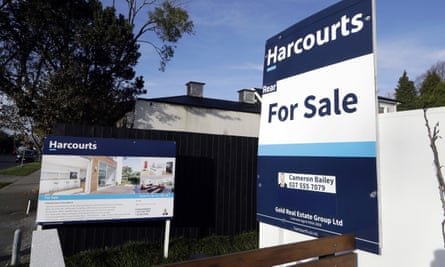In one neighbourhood, the first metric was the letterbox: a thickening sheath of “For Sale” advertisements clogging up the mail. “Almost daily junk mail advertising houses for sale,” said Greg, who lives in the central North Island city of New Plymouth. Then he noticed things changing on the street. “Every house on our road that has sold since we moved in three years ago has sold within a week,” he said. “But now the house down the road has been on the market for about a month with no signs of moving.”
The same trickle of symptoms are becoming visible in many cities across New Zealand: for-sale signs staying up as the lawns grow around them, auctions passing by with no bids, listing pages mounting up on real estate websites. For years, the country’s housing market has been on a seemingly-unstoppable upward trajectory, with homes in major centres averaging at over $1m a pop. Now, New Zealand is in the midst of some of the largest drops and slowdowns since the aftermath of the global financial crisis. Some banks are predicting a 10% fall over the course of 2022.
The Guardian asked readers to share how they were experiencing drops in the market, and found a mixture of trepidation, relief and hope.
As economists warn of “monster” inflation that could push mortgage payments up, some of New Zealand’s locked-out homebuyers are hoping they might be able to pick up the pieces.
“I’m partly excited about this, any change from the sky-high property market of the last two years is a potential ‘in’ for me as a first homebuyer,” said Megan, 35, a design director from Wellington. “However I’m also terrified of the looming recession and what that means if I were to be dealing with a mortgage for the first time as well as new costs like insurance and rates.”
For some, it’s the first glimpse of a chance at owning a property. “My partner and I believe the drop in prices mean we might be able to purchase a house this year,” said Shayna,* an IT worker in Wellington. “We’re going to wait a few more months to see if it drops slightly more. We’re lucky to be in the fortunate position of having an above average, double income and potential help from parents – I think we would really struggle if it weren’t for these factors, but we’ll see what happens.”

“Frankly, it’s a relief,” said Will, a public servant in his late 20s, “I do worry for friends who have really stretched themselves to buy a house who will now face massively increased payments.”
A pressing social problem
Those concerns are widespread: a perfect storm of rising interest rates, tighter lending laws, inflation, high cost of living and dropping prices. Consumer NZ surveying released last week found just 16% of New Zealanders thought it was a “good time to buy” in February 2022, down from 25% in October 2021. Conversely, 58% thought it was a bad time to buy, up 8 percentage points. New Zealanders were increasingly concerned that a house might not hold its value – an increasing portion believed homes would drop in value over the next year, and fewer thought it would increase. 83% overall thought the housing market was still either “overinflated” or “out of control”.
That means many new buyers are concerned about stretching beyond their means – and some who bought when the market was at its peak may find themselves in trouble.
“I’m torn between trying to bag a good house for a good price and lock in a reasonable interest rate for a couple of years to try and ride it out, or just sitting tight for the next 6-9 months to see which direction it goes,” Megan said. “Wasting $27,500 a year on rent is incredibly painful, but at least I’m currently only dealing with the rising cost of living – if I get a mortgage I’ve got to add the pain of high interest rates on top of that.”
New Zealand’s runaway housing market has long been seen as one of the country’s most pressing social problems, creating and entrenching both class and generational wealth inequalities. So for some who already own homes, the change is bittersweet: happiness that their peers or the next generation might be able to get on the ladder, combined with the anxiety of watching their own houses lose value. “I’m relieved it’s slowing,” said Tracy, 36, of Hawkes Bay, “Our property must be worth over a million by now, but I would be delighted to see values halve – even drop to a quarter of their peak.”
Her sentiment was echoed by Jess, 44, an educational consultant from Waikanae. “My partner and I own our home in a small town and its value has gone from $340,000 to $1.03m in eight years. It’s ridiculous. We have no idea how any average people can get their first home or how impossible it must feel for low income earners. We will be happy to see our value come down – it means a more equitable New Zealand may be possible.”
“I’m pleased this has happened,” said David, 52, a business owner in Auckland who was in the process of selling his own home. “We were way out of kilter and hopefully this will help young homebuyers. [I’m] sad for those that purchased just last year and hope that not too many are affected badly.”
*Shayna’s name has been changed to anonymise them.

Comments (…)
Sign in or create your Guardian account to join the discussion